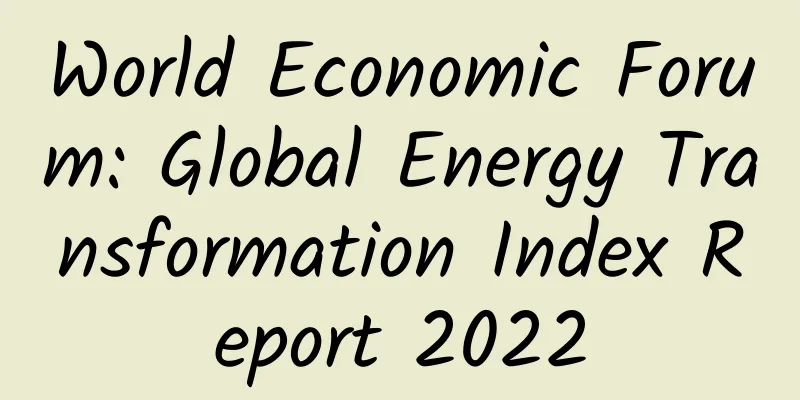World Economic Forum: Global Energy Transformation Index Report 2022

|
According to the 2022 report "Driving Effective Transformation of Energy Systems", with high fuel prices, commodity shortages, slow progress in climate goals, energy justice and energy access, accelerating comprehensive energy transformation has become an increasingly urgent task for countries. Over the past decade, the Forum has published the Energy Transition Index report every year to benchmark the energy transition of various countries. Based on this, the Forum and Accenture jointly released this special report, which provides detailed and important recommendations for governments, businesses, consumers and other stakeholders to help all parties promote energy system transformation. In the process of coping with energy market fluctuations, it is very important to prioritize the promotion of resilient energy transformation and diversification of the energy structure. The report emphasizes that in order to accelerate the transition to clean energy supply and demand, more countries need to make binding climate commitments, establish long-term visions for national and regional energy systems, attract private sector investors to participate in decarbonization projects, and help consumers and the workforce actively adapt to new changes. “The window of opportunity to prevent the worst consequences of climate change is closing rapidly. Countries could face multiple risk events in the future, which would increase the risk of disruptions in energy supply chains,” said Roberto Bocca, Director of Energy, Materials and Infrastructure at the World Economic Forum. “It will be difficult to make decisions on urgent issues such as energy security, sustainability and affordability in the short term, but we must redouble our efforts to act now.” The published report also reveals structural barriers to balancing energy affordability, security, availability and sustainability, mainly due to the impact of the following factors on the energy system: increased energy demand after the pandemic, fuel supply bottlenecks, inflationary pressures, and adjustments to the energy supply chain caused by the Russia-Ukraine conflict. To cope with the current difficult situation, countries must strive to diversify in two main areas: in the long term, diversify the internal energy mix; in the short term, it is necessary to diversify the fuels and energy suppliers used. Most countries rely on only a limited number of trading partners to meet their energy needs, and their energy diversification is insufficient, so they lack the flexibility to respond to supply chain disruptions. Among the 34 advanced economies covered in the report, 11 rely on only three trading partners to meet more than 70% of their fuel imports. “The current energy crisis has highlighted the importance of energy for people and economies,” said Espen Mehlum, Director of the Energy, Materials and Infrastructure Benchmarking Programme at the World Economic Forum. “The key task now is to continue to strengthen climate action by addressing the structural risks that have become apparent, and policies and investments will largely determine the success of this task. By stepping up investments in clean energy infrastructure, renewable energy, clean hydrogen and new nuclear power, we can strengthen the resilience of the energy system while contributing to achieving emissions reduction targets.” “Governments should invest in decarbonizing their energy systems while ensuring affordable energy supply, while businesses should work to adopt low-carbon technologies and energy-efficient processes,” said Muqsit Ashraf, senior executive director and global energy industry leader at Accenture. “Value chain and industrial decarbonization initiatives have huge potential for reducing emissions and should be a priority. This potential can be unlocked by strengthening collaboration among multiple stakeholders, including customers, suppliers and regulators, to jointly implement action plans such as circular supply networks and CO2 treatment plants.” Furthermore, there is a need to protect consumers and ensure affordable access to energy. The PDF version will be shared on 199IT Knowledge Planet, just scan the QR code below! |
<<: Will capital be defiled when it enters the pure holy land of the second dimension?
>>: IIC: Industrial Internet of Things Artificial Intelligence Framework White Paper
Recommend
360 Privatization: Zhou Hongyi Dreams of the Top of the Internet
[[138275]] The privatization of 360 has been plan...
The football field at the end of the world invites you to immerse yourself in the experience →
On the other side of the North Atlantic Ocean, th...
Baidu promotion video information flow advertising display style - live broadcast
Information flow advertising style - live broadca...
Quantum interference makes counting stars easier
The exploration of the deep night sky has been wi...
Humanoid robots will run a half marathon with humans
On March 4, at a press conference held by the Bei...
iOS14 is coming soon. Lao Tang talks about the development history of iOS versions
In 2007, 10 years after returning to Apple, Steve...
How to avoid remote work failures: DingTalk, WeChat for Work, or Lark, which one is more suitable for you?
The COVID-19 pandemic has brought online office w...
Movies and TV shows show people vomiting blood in various ways... Is it really reasonable?
An actor's self-cultivation includes not only...
Beware! Internet celebrity "Bug Agent" is sneaking into China... Netizen: This picture scares me!
The reporter learned from Chengdu Customs on the ...
Panda was once a name that only belonged to the red panda...
Original title: "The Neglected Life of the R...
“A Bite of China 4” reveals: When food meets physics, it’s amazing!
"A Bite of China" presents Chinese food...
[Practical Information] Information flow advertising landing page treasured by people from all industries!
We all know that the task of most landing pages i...
Can we keep a dinosaur in the modern world?
With the release of the movie "Jurassic Worl...
Huawei customer service responds to Android license expiration: Google services can still be updated but cannot be used on new phones
According to foreign media reports, the temporary...
Renewing domain name for a long time is helpful for ranking
In a patent application filed by Google in Decemb...









